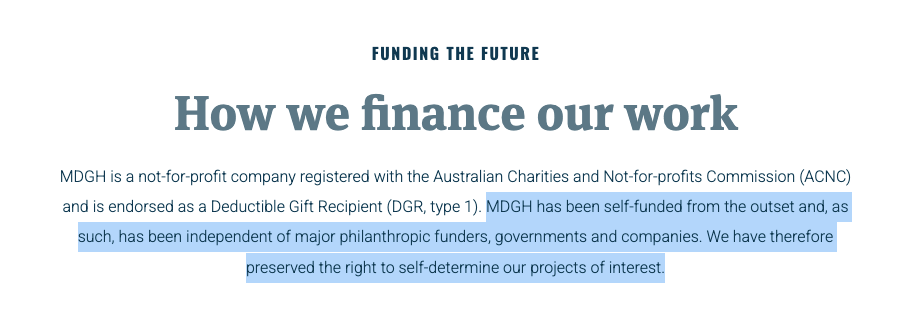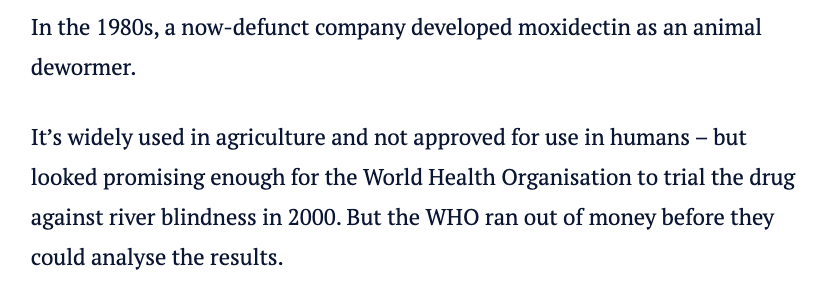"Animal Dewormer...Upended the Pharma System"
But no, it's not Ivermectin.
A legacy media article appearing in Australia’s premier “news” entertainment organisation, “Nine Entertainment Company” was published just days ago:
Authored by its national science reporter, Liam Mannix, it tells the story of an “audacious strategy” to bring drugs to market, upending the normal development pathway.
You see, there is only a market for “public health” for Big Pharma if people are able and willing to pay:
And there is simply no market for the sick, dying plebs in the developing world.
The drug in question?
It treats river blindness.
It treats scabies.
Did you guess it?
It’s not Ivermectin.
No, it’s “Moxidectin”.
It’s not yet available on Australia’s Pharmaceutical Benefits Scheme, but it will be handed out to “hundreds of thousands of patients” in Ghana this week after an “independent team” of Australian scientists won a rare approval for the drug from the FDA (not yet from Australia’s TGA - the research is still ongoing in this space).
“Medicines Development for Global Health” (MDGH), the team behind the efforts to get Moxidectin approved, proudly boasts its independence on its webpage:
Just how independent of “major philanthropic funders”?
Scroll just a bit further on the page to the “Support Received So Far” section of the same page:
Hmmmm……
The details of the relationship with the Bill and Melinda Gates Foundation are not explored in detail. Suffice to say the details of the “case study for changing the supply paradigm for global health medicines” beyond the aspirational jargon are…murky.
The Bill and Melinda Gates Foundation are, after all, known for their rather sizeable philanthropic and pharmaceutical entanglements along with their fixation on “vaccinating” the universe.
Anyhow, back to the story at hand.
Dewormers are again all the rage.
Though Moxidectin was approved by the FDA in June 2018 and its clinical trial results were published in The Lancet in October 2018, it was news in Australia just the other day because only last week the 250,000 doses were handed out by the Ghana Health Service.
You see, drug development really does take time:
Jokes aside, the meddling of large philanthropic interests resulting in the sponsorship of medicines that yield little-to-no-profit for Big Pharma should be applauded.
This has long been a problem for Big Pharma, as acknowledged by one former executive, when discussing the low-price-low-profit medicines space:
“Big pharma” (lower case in the article for reasons unknown) doesn’t care about people or “public health”; it cares about profits and selling “medicines” to sick and rich people.
On reflection, we wonder what it took for the author of this article to endorse a new medicine, or at the very least to simply report on it?
Imagine having adopted the same curiosity about all pharmaceutical interventions during the pandemic for the treatment of COVID-19. Although Moxidectin could be more effective than Ivermectin in treating river blindness and scabies, very limited scientific evidence published so far is offered to support its promise. There are also concerns about Moxidectin’s safety which was considerably worse with mild-to-moderate adverse events when compared with Ivermectin.
I suppose we’ll see how that plays out once it’s rolled out to a lower-middle income population in a playbook that’s all-too-familiar from such noted philanthropic organisations.
So, here we have an example of the honesty we sorely missed from the legacy media during the pandemic in reporting this story.
Is it now becoming safe in the legacy media to again report on the promise of low-cost medicines with even just the mere potential to improve health outcomes enough to endorse them?
Even animal dewormers?
Even using the words “Big Pharma” and its prejudice against poor people (even if “Big Pharma” is written in the less-impactful lower case).
How far the legacy media has come in just a few short years of this supposed pandemic.









LOL @ the thumbnail - an NPC in a press hat.
Thanks for the article.
Great find here!! Anything involving BG is sus.